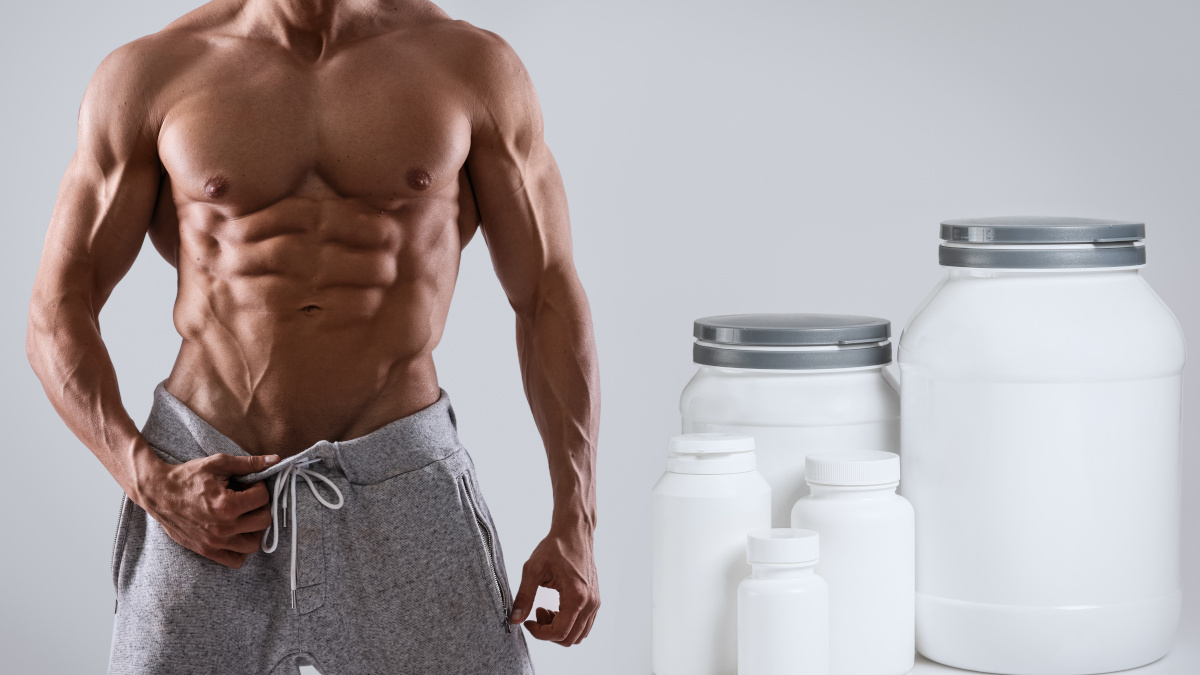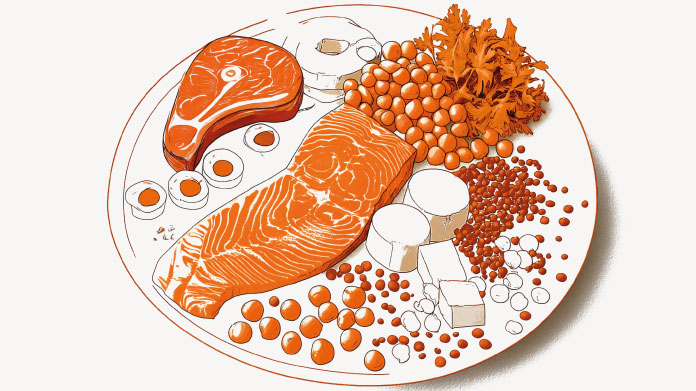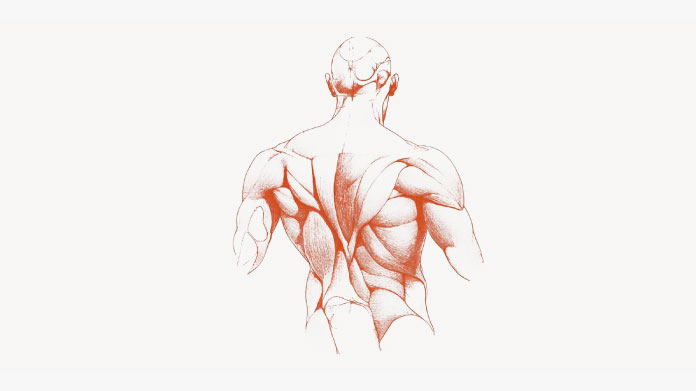The best supplements to take if you want to gain muscle
Would you like to be able to show off an impressive, muscular physique in the space of a few weeks or months? Here are the top five supplements for helping you to gain muscle mass more effectively.

Gaining muscle: some basic principles
On paper, it’s easy to gain muscle mass: you simply have to consume more calories than you expend (for this, it helps to know your basal metabolic rate). That said, it’s worth observing a few basic principles over and above merely upping your calorie intake if you want to optimize your increase in muscle mass. You need to:
- practise resistance training, at least 3 to 4 times a week, applying the principle of progressive overload (there are many other approaches to gaining muscle but this is the most widely-used … and it’s effective);
- eat sufficient protein to enable you to build muscle. This means consuming 1-2g of protein per kilo of bodyweight a day;
- avoid junk food and instead prioritise a healthy, balanced diet, containing all necessary nutrients (carbohydrates, fats, vitamins, minerals, essential amino acids, etc.) ;
- keep yourself well-hydrated by drinking at least 2 liters of water a day, in addition to anything you drink during training sessions;
- get enough sleep: muscle is built when the body is at rest, not during exercise;
- reduce your alcohol consumption as it damages and weakens the body, and encourages you to gain fat and lose male reproductive hormone which is essential for muscle synthesis (1).
Various dietary supplements can help you stick to these principles.
Whey protein, the classic supplement for building muscle
It’s no coincidence that this is the no. 1 choice among weight-training enthusiasts: whey is a significant source of protein which is quick and easy to take and digest.
Whey protein comes, naturally enough, from whey, a liquid by-product of the manufacture of cheese, fromage blanc and some types of yogurt. It contains a sizeable amount of protein and essential amino acids.
There are various kinds of whey protein, one of the best being whey protein isolate. This is because it undergoes a process of cross-flow microfiltration which allows for maximum protein extraction, and as the proteins remain unchanged, their amino acid profile is preserved (2).
Taking powdered whey is therefore an easy way of achieving the recommended daily dose of 1g-2g per kilo of bodyweight needed to gain muscle mass. It can be consumed in between meals, as a morning and afternoon snack (3).
BCAAs, energy and muscle mass
All proteins contain amino acids - they are their essential components. For example, animal proteins contain three branched-chain amino acids (BCAAs): leucine, isoleucine and valine, in a ratio of 2:1:1.
Instead of being metabolised by the liver like the majority of nutrients, these amino acids are directly absorbed by the muscles as a source of energy. That’s why those who do strength-training sometimes take BCAAs (as found in the supplement BCAAs, in a 2:1:1 ratio) immediately before or during training sessions, in order to provide their muscles with more energy to maximise their exercise and thus their muscle-building results (4).
Role of creatine in gaining muscle mass
Creatine is also an amino acid present, in the form of phosphocreatine, in proteins, especially animal proteins.
It is one of the main sources of energy for the muscles. Phosphocreatine actually combines with adenosine diphosphate (ADP) to produce adenosine triphosphate (ATP) and creatine.
It is thus used by the body to meet the demands of short but intense physical effort, such as that experienced during resistance training.
Many studies have shown that creatine increases physical performance during successive, short-duration, high-intensity exercise. In addition, daily supplementation with creatine has been shown to improve the effects of resistance training on muscle strength in those aged over 55 (5).
That’s why creatine (in powdered form, such as the supplement 3-Creatine) is one of the most popular supplements among those wishing to increase their muscle mass.
L-Glutamine, an amino acid crucial for the muscles
L-Glutamine is another non-essential amino acid (which means the body can produce it as required from the diet) which plays a crucial role in muscle function.
In fact, the body itself produces glutamine when engaged in regular physical activity such as weight-training. Conversely, our reserves of glutamine fall after intense exercise, and also when we’re subject to significant stress.
Consequently, many sports enthusiasts take it in the form of a dietary supplement (such as L-Glutamine): if you’re exposed to significant levels of stress on a daily basis, at work for example, and you engage in intense strength training more than four times a week, your body’s glutamine levels will be low (6).
Remember your vitamins, too
Gaining muscle mass involves significant energy expenditure, intensive exercise, and as a result, fatigue, muscle aches, constant recovery, metabolic stress, etc. What’s more, the body loses a number of essential minerals and trace-elements through perspiration.
So when you’re trying to gain muscle mass, it’s also important to make sure you have a good intake of vitamins, minerals and trace-elements, especially:
- for the immune system (which can be compromised by excessive physical activity, as explained in this article on sport and health): vitamins C, D, A, and B6, zinc, etc. ;
- for energy metabolism: vitamins B1, B3 and C, biotin, magnesium ;
- for protecting cells against oxidative stress: vitamins B2 and E, manganese, selenium.
To ensure a good intake of all these nutrients, many sports enthusiasts choose the ease and convenience of a comprehensive multivitamin supplement (such as Daily 3, which contains multiple vitamins, minerals and trace-elements).
Additional supplements to take when you’re trying to gain muscle: probiotics
Last but not least, gaining muscle involves regular consumption of significant amounts of food, placing the digestive system under constant stress: between meals and snacking, the body is in a constant state of digestion.
That’s why, for peace of mind and to prevent digestive discomfort, many of those who practise strength-training also choose to take probiotics (such as Probio Forte).
References
- SALLINEN, J., OJANEN, T., KARAVIRTA, L., et al. Muscle mass and strength, body composition and dietary intake in master strength athletes vs untrained men of different ages. Journal of sports medicine and physical fitness, 2008, vol. 48, no 2, p. 190.
- MULVIHILL, DMo et DONOVAN, M. Whey proteins and their thermal denaturation-a review. Irish Journal of Food Science and Technology, 1987, vol. 11, no 1, p. 43-75.
- VOLEK, Jeff S., VOLK, Brittanie M., GÓMEZ, Ana L., et al. Whey protein supplementation during resistance training augments lean body mass. Journal of the American College of Nutrition, 2013, vol. 32, no 2, p. 122-135.
- BLOMSTRAND, Eva et SALTIN, Bengt. BCAA intake affects protein metabolism in muscle after but not during exercise in humans. American Journal of Physiology-Endocrinology and Metabolism, 2001, vol. 281, no 2, p. E365-E374.
- FARSHIDFAR, Farnaz, A PINDER, Mark, et B MYRIE, Semone. Creatine supplementation and skeletal muscle metabolism for building muscle mass-review of the potential mechanisms of action. Current Protein and Peptide Science, 2017, vol. 18, no 12, p. 1273-1287.
- PHILLIPS, George C. Glutamine: the nonessential amino acid for performance enhancement. Current Sports Medicine Reports, 2007, vol. 6, no 4, p. 265-268.
Keywords
12 Hours
The new packaging is excellent
The new packaging is excellent - finally! No more squashed boxes and torn envelopes.
GORAN
1 Days
Great Product
Great Product
Larry Garrett
5 Days
Quick shipping
Quick shipping; good price. No issues!
Mary McCarty
7 Days
Thr product is very good and is helping…
Thr product is very good and is helping me on my health. Then is always on time
LUGO Luz
9 Days
Buying was fine
Buying was fine. I had problems with the website not recognizing my login info, and had to call to get it fixed. Other than that, everything was good.
David S. Clark
9 Days
Your super maca and super ginseng are…phenomenal
Your super maca and super ginseng are phenomenal supplements that compliment each other when taking them together. Fantastic feeling of well-being and lots of mid day energy without the crash.
Keith Mason
12 Days
I have had amazing results with every…
I have had amazing results with every supplement I've purchased. I am extremely satisfied with this company
kirstin Torres
12 Days
Fine products
Fine products . They are on the leading edge of online supplements. The only issue -so far-is they sometime run out of subscription items.
Jason Argos
15 Days
The ordering process is very user…
The ordering process is very user friendly and the products always come in a timely manner.
CARTER Rhonda
16 Days
The price for Dr
The price for Dr. Pero's AC-11 is reasonable and in line with his views. (my former colleague). Keep it pure.
CAMPBELL Clayton
19 Days
Right on every time.
Right on every time.
Arthur Nicholas
22 Days
They are cheaper than everyone else and…
They are cheaper than everyone else and the shipping was fast. Great company.
Patricia Adams
28 Days
Availability of quality health…
Availability of quality health supplements and it's wide variety is impressive. Ordering is seamless and shipping even during the holidays is well streamlined.
Mohamad Hussein
43 Days
A Product worth waiting for when not…
A Product worth waiting for when not available and then arriving as a surprise!
DOMINIC
44 Days
On time shipping
On time shipping
GEORGE Verne




